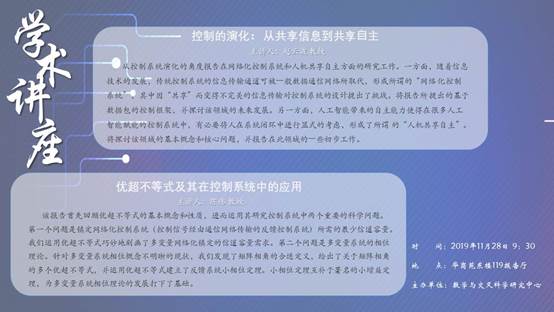
Evolution of Control: From Sharing Information to Sharing Autonomy
Presenter: Professor Zhao Yunbo
From the perspective of control system evolution, the research work on networked control systems and human-machine sharing autonomy will be reported. On the one hand, with the development of information technology, the information transmission channel of traditional control systems can be replaced by general data communication networks, forming a so-called "networked control system", in which information transmission that becomes imperfect due to "sharing" presents challenges to the design of the control system. The proposed packet-based control framework will be reported, and the future development of the field will be discussed. On the other hand, the autonomous ability brought by artificial intelligence makes it necessary to explicitly consider people in the closed loop of the system in many artificial intelligence-enabled control systems, forming the so-called "man-machine shared autonomy". The basic concepts and core issues in this field will be explored, and some preliminary work in this field will be reported.
Superior Super Inequality and Its Application in Control System
Presenter: Professor Chen Wei
The report first reviews the basic concepts and properties of the superior super inequality, and then uses them to study two important scientific issues in control systems. The first problem is the minimum channel capacity required for a stabilize networked control system (a feedback control system in which control signals are transmitted via a communication network). We use the superior super inequality to deftly characterize the channel capacity requirements of multivariate network stabilization. The second problem is the phase theory of multivariable systems. Aiming at the current situation that the phase concept of multivariable systems is not clear, we have found a suitable definition of the phase angle of the matrix, given many superior super inequalities about the phase angle of the matrix, and used the superior super inequalities to establish the small phase theorem of the feedback system. The small phase theorem is complementary to the well-known small gain theorem, which lays the foundation for the development of phase theory for multivariable systems.
Time: 9:30, November 28, 2019
Address: E119 Lecture Hall, Huagang Courtyard East Building
Organizer: Research Center for Mathematics and Interdisciplinary Sciences
(Editor in Charge: Lei Hao)